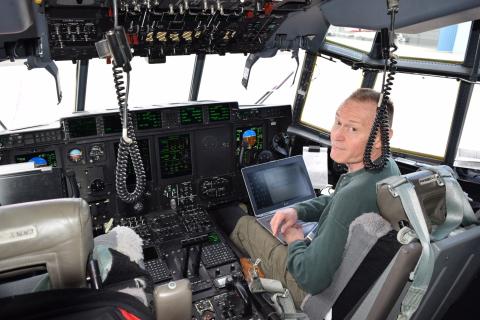Whether it’s supporting the evacuation of almost 5,000 refugees from Kabul during the Afghanistan withdrawal, to flying air missions in support of the Italian National Research Program in Antarctica, to providing domestic support to Italy during the height of the COVID-19 pandemic, the Italian Air Force relies heavily on its fleet of C-130J Super Hercules and C-27J Spartan transports.
To keep these massive airborne wonders performing at an optimum level, the Italian Air Force works closely with Jacobs to provide data solutions to ensure that critical software platforms are kept updated, which assist with route planning, communications, airdrop information and ground obstruction mapping for low-flying missions. In a similar manner, Jacobs also supports the Royal Canadian Air Force, with whom Jacobs recently completed a new agreement to provide data support for its fleet of C-130J Super Hercules planes building on three prior software releases over the past five years
To learn more about the work that goes into supporting these two fleets, we sat down with Garry Poegel, Mission Planning Program Manager and Product Owner with Jacobs Software Engineering Center (JSEC), who leads the team responsible for delivering the software upgrades for both Air Forces.
Garry, can you explain for us what your team does in support of the Italian Air Force and Royal Canadian Air Force?
Our software allows mission planners to collect and organize, visualize and ultimately format the data necessary for loading onto their aircraft. Beyond keeping their software platforms up-to-date, we provide additional features which are customized for their mission needs and maximizes the usefulness of existing aircraft features.
For Italy, our work is an overall technology upgrade that builds upon what we created for Canada in their last contract, in which we provided the ability to support specific mission needs with regards to low-level flight operations and obstacle avoidance. Our next solution for Canada upgrades this technology while supporting new avionics components which are expected to be installed in all their aircraft.
Can you share with us a little bit about your team’s process? What is involved in the work?
Our software development process is based on the Scaled Agile Framework (SAFe) which increases our productivity and product quality. It also emphasizes increased end-user involvement and the ability to deliver product features on an incremental and regular cadence for customer review. Our delivery plan includes quarterly product demonstrations and interim deliveries plus planning meetings with the customer to refine the expectations for next delivery.
How would you describe Jacobs’ key differentiator in this work?
Our differentiator is the ability to build a custom solution specific to the customer needs. We are directly competing with a U.S. Air Force-developed generic solution that many countries use, but Italy and Canada repeatedly have chosen our solution since it can meet their particular needs. We are also recognized with the ability to provide a high-quality solution that is aggressively tested on the physical planes at the customer sites. Our personnel have the skills required to understand the customer missions, how they use the aircraft and what the data that our software produces means to the aircraft. We work closely with end-user – real war fighters - to improve the solution for how they need to use it.
Our work by the numbers
-
20
Italian Air Force C-130J Super Hercules supported by Jacobs software
-
12
Italian Air Force C-27J Spartans supported by Jacobs software
-
45 K
previous product development hours (Canada & Italy)
-
25 K
current planned product development hours (Canada & Italy)
“Jacobs’ Unique Planning Component is indeed a welcomed software solution for the C130J. Not only is the tower handling functionality unique, it offers aircrew reliable means of identifying and correlating vertical obstructions from cockpit avionics to the sky. Through a keen focus on the operator, and therefore designing and building the software specifically with them in mind, Jacobs has moved the software forward from being functional to software that improves operations.”
Meet the Jacobs team
- Garry Poegel – Mission Planning Program Manager and Product Owner
- Nancy Denninger – Lead Systems Engineer responsible for aircraft testing
- Dan Grose – Subject Matter Expert (and former pilot)
- Serafin (Sam) Makris – Team Scrum Master and Software Developer
- Michael Bolen – Software Developer
- Dalton Goins – Software Developer
- Mete Kabakcioglu – Software Developer
- Lynn Poliquin – Lead Software Tester



















































